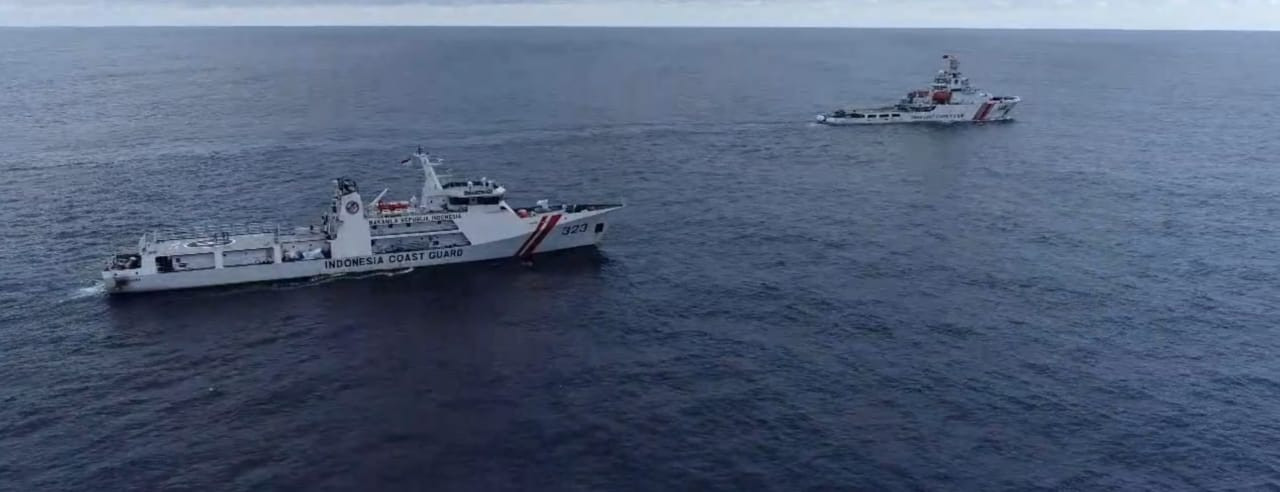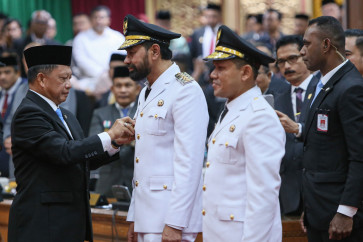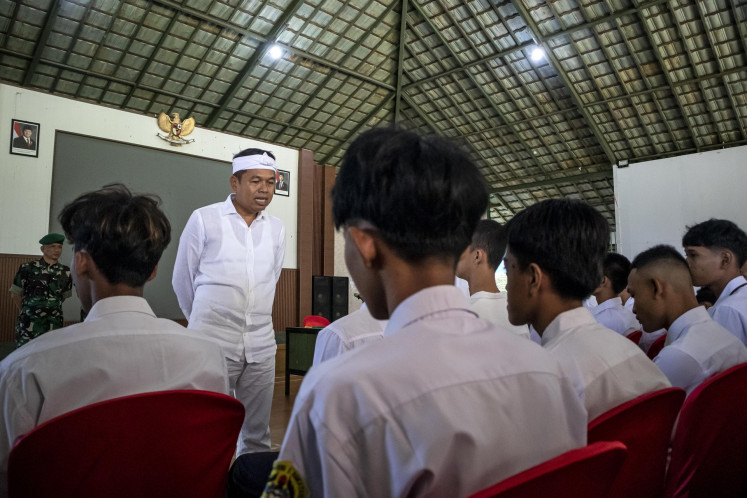Protecting Indonesia’s maritime zone in the age of global competition
Through blue economy diplomacy, the ministry should lead Indonesia’s global efforts in sustainable fisheries management and marine conservation.
Change text size
Gift Premium Articles
to Anyone
 Indonesian Maritime Security Agency (Bakamla) patrol vessel KN Pulau Dana (left) shadows China Coast Guard (CCG) patrol vessel CCG 5402 inside Indonesian exclusive economic zone (EEZ) on North Natuna Sea on Oct. 25, 2024. The CCG 5402 claimed that it was conducting patrol on Chinese jurisdictional waters and disrupted 3D seismic activities conducted by PT Pertamina East Natuna using MV Geo Coral. (Courtesy of Bakamla/-)
Indonesian Maritime Security Agency (Bakamla) patrol vessel KN Pulau Dana (left) shadows China Coast Guard (CCG) patrol vessel CCG 5402 inside Indonesian exclusive economic zone (EEZ) on North Natuna Sea on Oct. 25, 2024. The CCG 5402 claimed that it was conducting patrol on Chinese jurisdictional waters and disrupted 3D seismic activities conducted by PT Pertamina East Natuna using MV Geo Coral. (Courtesy of Bakamla/-)
A
s Indonesia charts its course toward the centennial of its independence in 2045, the maritime domain, long the heart of the archipelago’s identity, demands renewed strategic attention. In an era defined by intensifying power rivalry and increasingly irregular forms of competition at sea, securing Indonesia’s maritime zone is no longer just a matter of defense or sovereignty; it is a core pillar of national resilience, economic prosperity and geopolitical relevance.
Indonesia’s vast archipelagic geography makes it a maritime power by destiny, but not necessarily by design. Under the administration of President Prabowo Subianto, there is a historic opportunity to reimagine and reinvigorate the nation’s approach to maritime governance.
This involves upholding international maritime law, especially the United Nations Convention on the Law of the Sea (UNCLOS), while transforming the Maritime Affairs and Fisheries Ministry into a world-class institution. It also means advancing Indonesia’s maritime strategy in an interagency and multinational context and securing national interests in line with the long-term vision of Golden Indonesia 2045.
UNCLOS, often dubbed the constitution of the oceans, provides the legal framework that defines maritime entitlements, obligations and jurisdictional zones such as the territorial sea, exclusive economic zone (EEZ) and continental shelf.
For Indonesia, a country with over 17,000 islands and a vast 6.4 million square kilometer EEZ, the legal recognition afforded by UNCLOS is fundamental. However, laws are only as strong as the political will and capabilities to enforce them.
Indonesia’s experience in the North Natuna Sea, where illegal fishing, unauthorized incursions and gray-zone operations by foreign actors like China are increasingly common, illustrates the growing gap between legal entitlements and strategic control.
To uphold maritime law, Indonesia must move beyond rhetorical support for UNCLOS and actively reinforce its authority through surveillance, enforcement and coordinated diplomacy. This requires a whole-of-government effort that bridges legal commitments with geostrategic realities. Indonesia must not only defend its maritime rights but also be seen and respected as doing so, both by its people and by the world.


















